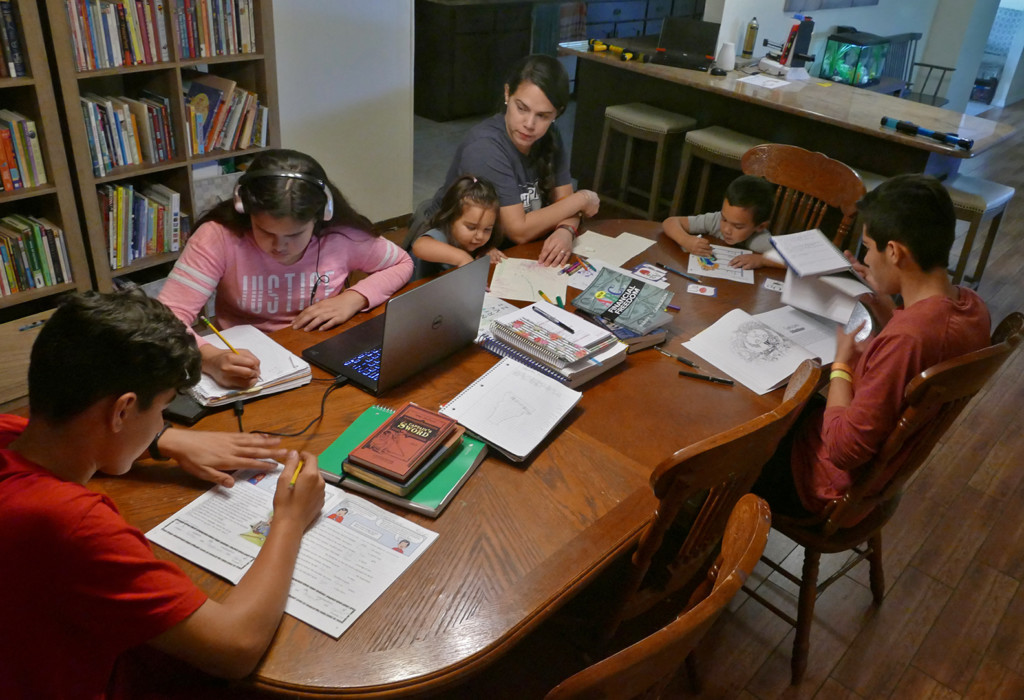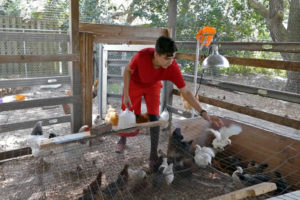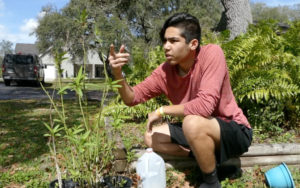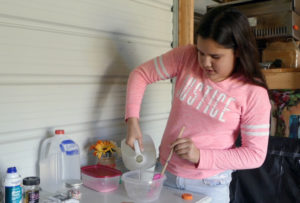
NEW PORT RICHEY, Fla. – Inside Evelyn Reyes’s ranchette, the dining room doubles as classroom. While black bean soup simmers on the stove, Reyes uses flash cards to work on letter sounds with Nathaniel, 4, and Abigail, 2, while Jordan, 13, does Bible study; Alysson, 11, works on reading; and Matthew, 15, logs into a coding class through Florida Virtual School.
The dining room is only one piece of the Reyes education program. But a family learning together in its own cozy digs gets to the heart of why Reyes, who is Cuban-American, and her husband, who is Nicaraguan-American, decided to leave traditional public schools eight years ago and go the home school route.
“I only have 18 years to train them, and build good character, and build in forgiveness and kindness and service,” Reyes said. “I understand the order of (traditional schooling), but it wasn’t something for us. The things that were the most important to the school system weren’t the most important things to me.”
The Reyes family is the face of a trend.

According to the latest federal numbers, the number of Hispanic homeschooled students rose from 265,000 in 2012 to 444,000 in 2016, a 68 percent increase that far exceeds enrollment growth of Hispanic students in public schools. Over that span, the percentage of homeschooled students who are Hispanic spiked from 15 percent to 26 percent.
Home education parents in Florida have noticed the change. When Reyes first started home schooling, she didn’t see many Hispanic families at the annual convention of the Florida Parent-Educators Association. Now she sees hundreds.
“I don’t feel like the only one anymore,” Reyes said. “More Hispanic families are thinking, ‘I can do this.’ ”
“The interest is there,” said Jennylina Duperon, another homeschool mom in the Tampa Bay area. She’s been homeschooling her 7-year-old twins, Andres and Andrea, for three years. “The Hispanic communities are starting to explore the idea more.”
Why isn’t exactly clear. Brian Ray, president of the National Home Education Research Institute, said he is unaware of any studies or surveys exploring the reasons behind the uptick.
Hispanic home school parents interviewed by redefinED cited many of the same factors as other home school parents. Safety. Negative influences. Too much testing. They said Hispanic families want more flexibility to balance school and family. They want more emphasis on character and faith. (Interestingly, the most recent federal surveys also showed a dip in the percentage of homeschool parents who find it important to provide religious instruction.)
It helps a lot, the Florida parents also said, that they don’t have to go it alone. They noted the growth of co-ops and other resources that can orient newcomers and supplement their educational programs. Once a week, Reyes drives her children to a co-op site in a neighboring county so they can take classes ranging from anatomy and personal finance to music and painting.
But are there reasons that might be more Hispanic-centric?

“We are such family-oriented people. We are all about being together,” said Duperon, who is Dominican-American and whose husband is Puerto Rican. “My mom can home school my kids on days I have doctor’s appointments. They get that time with their kids. It’s beautiful. If there’s a rise (in Hispanic homeschoolers), I think that’s part of it.”
Ray with the research institute said there might be something to that. “I don’t know research on Hispanic family ‘closeness,’ “ he wrote in an email, “but I hear it and experience it.”
The homeschool trend lines sync with others involving Hispanic parents and education choice.
In Florida, one of the most choice-friendly states, the number of homeschooling families rose to 97,261 last year. The state doesn’t track demographics behind homeschooling. But the number of Hispanic students using the Florida Tax Credit Scholarship, the nation’s largest private school choice program, climbed to 39,475 last year, up from about 22,000 five years ago. (The program is administered by nonprofits like Step Up For Students, which hosts this blog.) Over the same span, the number of Hispanic students in Florida charter schools grew from 87,656 to 134,220.
This is not an aberration. In last year’s Education Next poll, Hispanics were more likely than white or black respondents to support charter schools (53 percent for, 26 percent against); tax credit scholarships (67 percent to 18 percent); and vouchers for low-income students (69 percent to 26 percent). When it came to “universal” vouchers for all students, black and Hispanic respondents both showed lopsided support, with 62 percent for versus 29 percent against.
Demi Leyva, a former public school teacher in Miami Lakes, is homeschooling her sons, William, 9, and James, 6. She said another factor for Hispanic and black homeschool families might be that they’re more likely to be zoned for schools they feel are underperforming and unsafe.
“Hispanics tend to be overprotective,” said Leyva, who is Cuban-American. “And guns, and shootings, and bullying, and violence, is out of control in some areas.”

Leyva said in her case, the big reason for homeschooling was “real education” with family.
“Homeschool allows you to have time with your family to explore the world,” she said. “If you’re rushing, rushing, rushing (with education), it takes a lot of the family life out of your life. My kids can help me load the dishwasher. They can take a break and go fish in the lake. They have time to do that in a regular life.”
Back in Tampa Bay, Reyes said kids’ learning shows on TV gave her a false expectation that traditional schooling would include a lot of hands-on science, field trips, outdoors fun. But in her experience, that wasn’t the case. At home, her three oldest work on long-term science projects that hew to their interests. (See the video for more.) For breaks, they head to the pond out back to identify wading birds and look for baby alligators.
With Mom in on the adventure, they’ve even had close encounters with a couple.
“How are they going to learn,” Reyes said, “if they don’t explore?”
https://youtu.be/A3z0Z2V6BCs



Well done article and three cheers for Hispanics (and all parents) who take charge like this rather than sending their children away to allow the government schools to teach, train, and indoctrinate them for 5 days per week, 9 months per year. It is no wonder that parent-led, home-based, not-tax-funded education (homeschooling) is growing all around the world amongst a diversity of people – dark- and light-skinned; rich and poor; urban and rural; high- and low-income; Hindu, Jew, agnostic, pagan, or Christian. In the peer-reviewed Journal of School Choice (2017) summary of only peer-reviewed research, Dr. Ray discovered that the home educated perform better academically, socially and emotionally, and into adulthood (including success in college/university) than those who attend public/government schools; 78% of the studies found that homeschooled students and graduates performed significantly better than their conventional or institutional school peers http://www.nheri.org/a-systematic-review-of-the-empirical-research-on-selected-aspects-of-homeschooling-as-a-school-choice/ Whether the propaganda in State-run schools is leftist, centrist, or rightist; heterosex-only or LGBTQ-ism; socialism, neo-Marxism, or hard-handed capitalism, freedom-loving parents do not want their children indoctrinated by the State. They do not want to subject their children to becoming peer-dependent, State-dependant, bullied, depresses, bored, and more in government-controlled institutions called school.